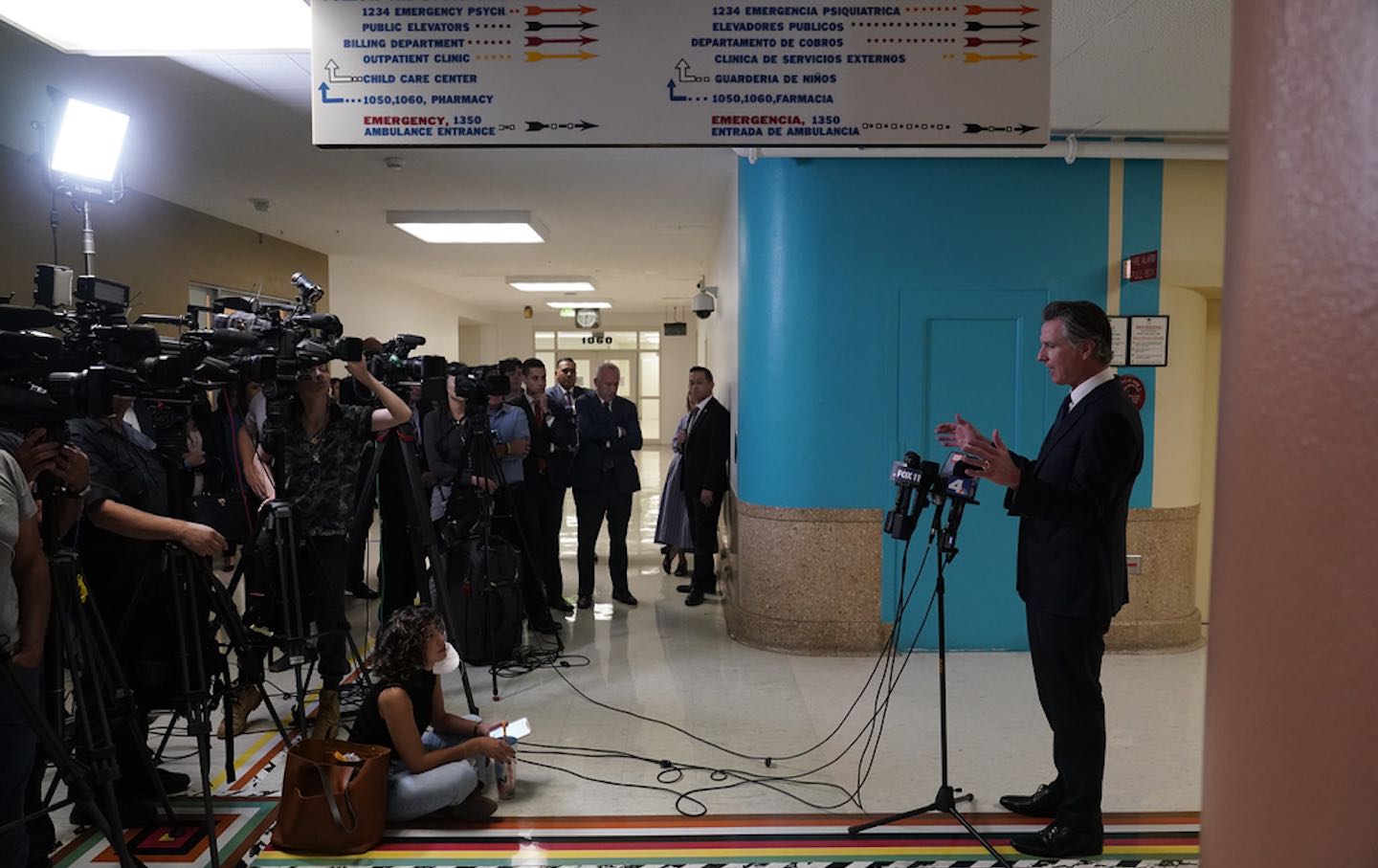California Gets One Step Closer to Universal Healthcare
This year, the Golden State expanded coverage to all low-income residents—regardless of immigration status.

California Governor Gavin Newsom speaks to the press at the Los Angeles General Hospital in October 2023.
(Damian Dovarganes / AP Photo)To little fanfare, as the new year has gotten underway, California has closed one of the largest remaining gaps in its healthcare coverage system. As of January 1, all low-income Californians, no matter their immigration status, no matter their age, qualify for healthcare coverage.
At the same time, a Medicare and Medicaid waiver kicked in for California eliminating the notorious asset tests that, historically, required poor people to spend down all their assets—sell their car, or, if they have a house, sell the house—before being able to access long-term care and the Aged and Disabled Program. In a country where upwards of half a million families per year declare bankruptcy in the face of unpayable medical debt, such moves at a state level to limit the financial damage caused by the need for long-term care are vitally important—and also show what could be done nationally if there were sufficient political will to render the healthcare system less financially punitive.
For healthcare and anti-poverty advocates, California’s ongoing healthcare-access expansion, and its efforts to limit the financial immiseration caused by medical needs, are momentous achievements, carefully developed over the last 13-plus years since the passage of the Affordable Care Act.
In 2010, at the time the ACA was passed, 6.8 million Californians lacked health insurance. That number, representing 19 percent of the state’s population, was about on par, percentage-wise, with numbers of uninsured nationally. In America, that year, 48.6 million people lacked access to healthcare. Perhaps even more dispiritingly, 7.8 percent of American children that year had no healthcare coverage. California was no exception to this sorry rule.
Yet now, in 2024, after a series of steps over the last few years in which MediCal was expanded to more and more groups who had been excluded from the original ACA formulations, California is inching closer to realizing the notion of universal healthcare coverage. By 2022, only 3 percent of Californian children had no healthcare access. California’s success in bringing healthcare to children stands in stark contrast to Texas, where nearly 11 percent of kids lack healthcare.
That California hasn’t yet achieved 100 percent coverage, despite the billions of dollars legislators have devoted to opening up healthcare access, is not for lack of state legislative will. It’s more to do with unconscionable federal rules rolling back Medicaid eligibility after pandemic-era expansions—and the GOP Congress’s refusal to stanch this crisis that has resulted in millions of low-income Americans’ suddenly losing their Medicaid coverage—as well as some individuals’ still not purchasing subsidized insurance plans. By last year, according to the state’s Legislative Analyst’s Office, 92 percent of Californians had healthcare coverage. Close to 2 million low-income residents had purchased subsidized private insurance through the state’s Covered California insurance marketplace. Millions more were newly eligible for MediCal.
As of January 1, another large population group—undocumented, low-income, working-age adults, are also able to access MediCal. The state estimates that this MediCal expansion, which has a $3 billion price tag, will bring healthcare within reach of an additional 700,000 adults. It makes California the only state in the country to expand health coverage eligibility to all undocumented residents, though several others, including Illinois and New York, have begun the process of bringing health coverage to at least a portion of the undocumented.
Researchers at UC Berkeley’s Labor Center and UCLA’s Center for Health Policy Research estimate that by year’s end the number of working-age Californians without health coverage will have declined to roughly 2.5 million people. That’s still an awful lot of people—and it shows what a heavy lift is involved in getting coverage to that last portion of the uninsured, mainly those too affluent to qualify for subsidized policies but too poor to be able to afford to buy them on the open market. But it’s orders of magnitude better than the numbers California was posting prior to passage of the ACA.
At some point in the next four years, it’s very likely that Gavin Newsom will be a contender for the Democratic Party’s presidential nomination. If he does decide to run, his achievements, while governor, in bringing California closer to the elusive goal of making healthcare available to everyone in the state, will deservedly be among his biggest selling points.
Disobey authoritarians, support The Nation
Over the past year you’ve read Nation writers like Elie Mystal, Kaveh Akbar, John Nichols, Joan Walsh, Bryce Covert, Dave Zirin, Jeet Heer, Michael T. Klare, Katha Pollitt, Amy Littlefield, Gregg Gonsalves, and Sasha Abramsky take on the Trump family’s corruption, set the record straight about Robert F. Kennedy Jr.’s catastrophic Make America Healthy Again movement, survey the fallout and human cost of the DOGE wrecking ball, anticipate the Supreme Court’s dangerous antidemocratic rulings, and amplify successful tactics of resistance on the streets and in Congress.
We publish these stories because when members of our communities are being abducted, household debt is climbing, and AI data centers are causing water and electricity shortages, we have a duty as journalists to do all we can to inform the public.
In 2026, our aim is to do more than ever before—but we need your support to make that happen.
Through December 31, a generous donor will match all donations up to $75,000. That means that your contribution will be doubled, dollar for dollar. If we hit the full match, we’ll be starting 2026 with $150,000 to invest in the stories that impact real people’s lives—the kinds of stories that billionaire-owned, corporate-backed outlets aren’t covering.
With your support, our team will publish major stories that the president and his allies won’t want you to read. We’ll cover the emerging military-tech industrial complex and matters of war, peace, and surveillance, as well as the affordability crisis, hunger, housing, healthcare, the environment, attacks on reproductive rights, and much more. At the same time, we’ll imagine alternatives to Trumpian rule and uplift efforts to create a better world, here and now.
While your gift has twice the impact, I’m asking you to support The Nation with a donation today. You’ll empower the journalists, editors, and fact-checkers best equipped to hold this authoritarian administration to account.
I hope you won’t miss this moment—donate to The Nation today.
Onward,
Katrina vanden Heuvel
Editor and publisher, The Nation








